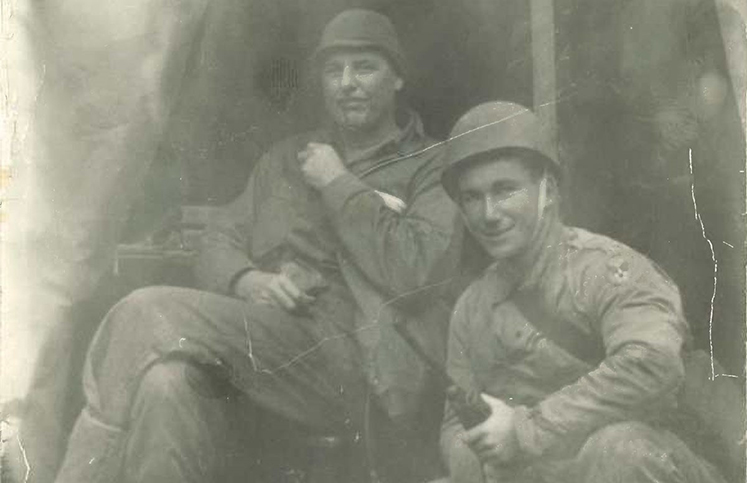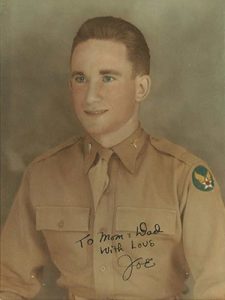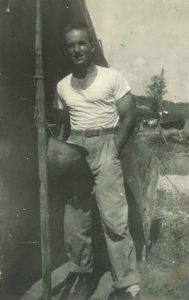Hidden in the attic were tales of war and sacrifice, love and resilience
By Lauren Stiller Rikleen for Next Avenue

It is always fun to read about other peoples’ attic discoveries of valuable art or historic artifacts. It is very different altogether to be the one to make such a find.
As I was moving an innocuous plastic container out of the way, I decided to see if there was anything inside I needed to keep. There was another smaller container with a tin foil top — clearly a sign that I was in the territory of my mom’s former belongings. I looked inside to see hundreds of impeccably organized letters, in careful script, and knew immediately what I had found.
An enlisted man
 My dad, Joe Stiller, left college and enlisted in the Army immediately after the bombing of Pearl Harbor. Like so many other young men of his generation, he felt the attack on American soil as a direct hit to his inner sense of patriotism. They enlisted by the thousands, joining a military that grew into the millions.
My dad, Joe Stiller, left college and enlisted in the Army immediately after the bombing of Pearl Harbor. Like so many other young men of his generation, he felt the attack on American soil as a direct hit to his inner sense of patriotism. They enlisted by the thousands, joining a military that grew into the millions.
While on a brief leave, my dad was introduced to a young woman of enormous grace. The youngest of three siblings, she had a smile that could power generators and a gentle sense of humor to match. They fell in love immediately and wrote to each other daily.
Those letters capture a historic period that often went untold by returning military men reluctant to relive even a minute of their miserable years by telling their stories. The “silent generation” was aptly named, as they bore their deprivation and, if lucky enough, came home, picked up the pieces of their lives and moved forward. War stories were not a part of their lexicon, and the memories were buried along with their friends killed on the battlefield.
My dad was no different. His letters from Okinawa provide a glimpse into a life he hated to remember. They also demonstrate how soldiers got through the most horrific of conditions.
His retelling of a brutal typhoon that destroyed the tents where they lived and devastated the island showed resilience and endurance. And even as he painted a picture of terror and helplessness as the storm spread, his own sense of humor came through as he described the aftermath. He closed the letter by stating that he hoped he did not sound like he was complaining, a glimpse into the stoicism of a soldier that would last him a lifetime.
A lost art
 Each letter was also a window into the deepening relationship with the woman he ultimately married when the war ended. They showed the emerging love that would continue until his death in 1993, and served as a source of comfort to my mom in the 22 years that she lived following his passing.
Each letter was also a window into the deepening relationship with the woman he ultimately married when the war ended. They showed the emerging love that would continue until his death in 1993, and served as a source of comfort to my mom in the 22 years that she lived following his passing.
Mom never had an interest in dating after dad died. These letters clearly demonstrate why. The remarkable love they shared in their years together was sufficient to last my mom’s lifetime, even as her sadness at his passing never diminished. As lonely as she was, she knew she would never have a relationship with the depth and clarity that she experienced with my dad.
I am struck by one significant generational difference reflected in those letters. This is not about bemoaning characteristics of the WWII generation that are missing today. In fact, I see elements of my parents’ devotion to each other in my son’s relationship with his fiancée and I see my dad’s grit and resilience in both my children.
But in a world in which technology has replaced letters, no generation in the future will ever experience the joy of finding the living memorial that letters provide. No shorthand text message can ever substitute for the emotion of a handwritten letter, nor will a text be lovingly kept for decades, let alone generations. No words typed on a cellphone can ever replace the image of a parent or grandparent hunched over a piece of paper, expressing deeply held emotions in script.
My parents’ words to each other during the deprivations of war served as the foundation of a loving and secure home for decades to follow. Their letters are a gift that endures. I smile at the thought of their great-grandchildren someday stumbling across them, and only hope they will be taught to read script.
© Twin Cities Public Television – 2015. All rights reserved.
